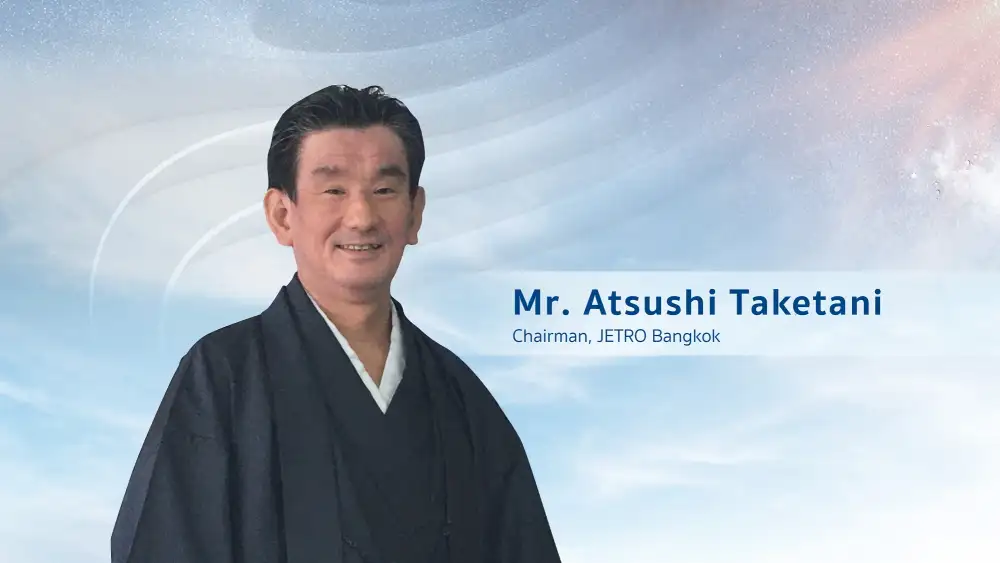
The Thai-Japanese Association, in collaboration with KASIKORNBANK and the Japanese Chamber of Commerce, Bangkok, held a seminar on "Thailand Post-COVID-19: Rain or Sunshine?" for the Japanese and Thai business communities to affirm that Thailand is ready to move forward in the post pandemic period. Most importantly, the Thai government has a clear policy direction to revive the domestic economy, overcome long-term structural issues and build new supply chains in line with ESG momentum to create a sustainable future.
The seminar began with an opening remark by H.E. Supattanapong Punmeechaow, Thailand's Deputy Prime Minister. He reaffirmed investors' confidence that "the Thai economy has already passed its bottom in the third quarter of this year and entered the stage of sunrise" and that "the new economic landscape for Thailand after COVID-19 is full of opportunities. To grasp them, it requires not only strengthening our existing flagship industries, such as tourism, health care, food for the future, automotive industry, but also paying attention to the climate change issue." Subsequently, H.E. Kazuya Nashida, Japanese Ambassador to Thailand, envisaged the future of Japanese-Thai cooperation as "a partnership of co-creation" and mentioned that "Japan and Thailand can jointly create new value and innovation. I believe that the relationship between Japan and Thailand, which has long been developed, can be an equal one where we share wisdom together and complement each other to create innovation with the aim of making a better society."
The seminar was followed by a panel discussion to visualize the policy landscape. Although large fiscal resources were employed to mitigate the COVID-19 impact, H.E. Arkhom Termpittayapaisith, Minister of Finance, assured that "at present, Thailand's fiscal status is still strong. The government's fiscal position has sufficient liquidity for the government's policy implementation." Regarding the concerns over the public debt level which its ceiling was lifted from 60% to 70%, "the public debt level is not a key point of focus. The government would rather focus more on debt affordability by closely monitoring the interest burden as compared to collected revenue." H.E. Arkhom emphasized that to address climate change issues, the government aims to promote usage of electric vehicles to tackle CO2 and PM 2.5 and eventually to promote Thailand as an automotive hub. Later, Mr. Danucha Pichayanan, Secretary General of NESDC explained that the government is well aware of key structural issues including aging society, labor shortage, education and infrastructure and plans for Thailand's transformation based on 4 key development dimensions - targeted manufacturing and service sectors, socio-economic opportunity and equity, sustainability and key enablers, especially high-performance workforce and streamlining government process. Meanwhile, Ms. Duangjai Asawachintachit, Secretary General of BOI explained that BOI is shifting its policy focus towards a sector-based approach and providing greater investment incentives to promote higher value-added supply chains, higher technological content, and industrial transformation. BOI also provides incentives to attract international talents to work in Thailand to mitigate skilled-labor shortage issues.
Afterwards, H.E. Varawut Silpa-archa, Minister of Natural Resources and Environment, provided a keynote address on Thailand's shifting towards ESG. He emphasized the need for participation from all levels that "it is imperative for governments, businesses and civil society to work together through public-private partnerships in climate action networks, carbon market mechanisms as well as regional and international cooperation. Plenty of business opportunities including industrial de-carbonization are open to us, but we have to act now".
The seminar was followed by a panel discussion on theimprovement of Thailand's business environment through regulatory and public sector reform. Business facilitation is vital for the country, in which the public sector plays an important role in providing a sound and good ecosystem for businesses. The Thai government prioritizes digital transformation by reviewing working processes and digitizing data so that information can be connected and shared among government agencies. Ms. Onfah Vejjajiva, Secretary General, Office of the Public Sector Development Commission mentioned that "we are moving towards digital transformation to become an efficient and effective digital government that responds to the people, foreign investors, and businesses." Meanwhile, Dr. Kobsak Pootrakool, Chairman of the subcommittee on business activity regulation reform emphasized that "to attract FDI into Thailand, the most important thing is to reduce unnecessary rules and regulations." The government plans to relax regulations to enable investment in S-curve industries, including immigration rules to attract global talents.
Subsequently, the seminar today was also attended by other high-profile businessmen, Mr. Vikrom Kromadit, Chairman of the Board of Directors of Amata Corporation and Mr. Noriaki Yamashita, President of Toyota Motor Thailand, as well as Mr. Atsushi Taketani, Chairman of JETRO Bangkok, to reflect some of key investment challenges for Thailand in moving towards a better operational business environment and becoming competitive among global and regional investment destinations.
Last but not least, Mr. Kalin Sarasin, the President of Thai-Japanese Association and Senior Chairman of the Thai Chamber of Commerce and Board of Trade of Thailand concluded that "Thailand's overall business environment is undoubtedly at sunrise. The growth path is lying ahead but the task ahead of us will not be easy. To that end, we've convened this critical seminar because we know that confronting today's economic issues as a result of COVID-19 will demand our concerted and collaborative efforts. Let us work together to ensure that our multi-stakeholder collaborations succeed to help Thailand build back better and towards sustainable and resilient society."